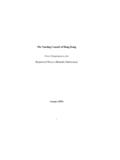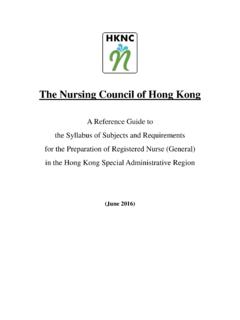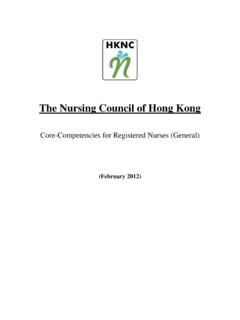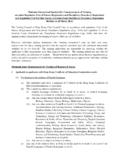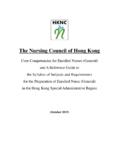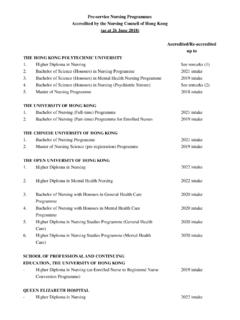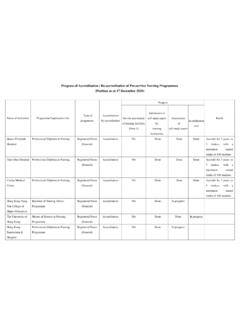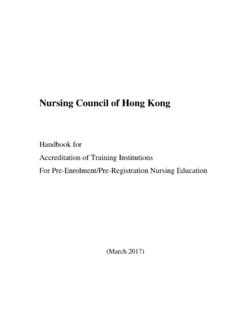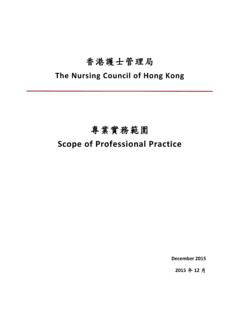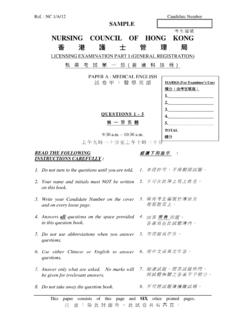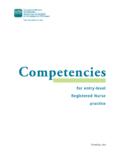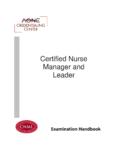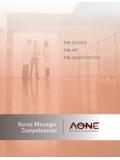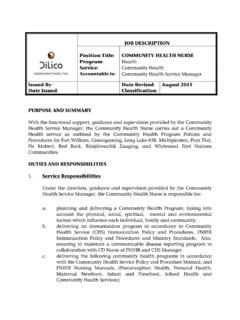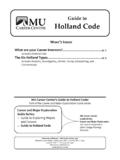Transcription of The Nursing Council of Hong Kong - nchk.org.hk
1 The Nursing Council of Hong Kong Core-Competencies for registered Nurses (General) (February 2012) CONTENT I. Preamble 1 II. Philosophy of Nursing 2 III. Scope of Core-competencies Required of a registered nurse (General) 3 Competence area 1: Professional, Legal and Ethical Nursing Practice 4 Competence area 2: Health Promotion and Health Education 5 Competence area 3: Management and Leadership 6 Competence area 4: Research 7 Competence area 5: Personal Effectiveness and Professional Development 7 Bibliography 8 I.
2 Preamble The role of the nurse is evolving as the mode of delivery of health care services has undergone major changes both locally and internationally in the past decades. In line with international trends, we are developing a health care system that provides lifelong holistic care, promotes health, enhances the quality of life and enables human development. The availability of qualified and competent health care professionals is the key to the delivery of quality health care services. As nurses play a pivotal role in the promotion, maintenance and restoration of health, we need to develop competent nurses who are able to take up extended and expended roles in the delivery of primary, secondary and tertiary care.
3 Thus, apart from the roles of a caregiver, the nurse needs to develop competencies to take up the roles of a health promoter, educator, counselor, care coordinator, case manager, researcher as well as that of a client advocate. Hence, education programmes for preparing nurses must ensure that the students acquired the essential competencies that enable them to fulfill these roles competently and ethically. This document has been developed by the Nursing Council of Hong Kong (NCHK) to serve the following purposes: 1. To state the philosophy of Nursing based on which the Nursing practice is developed in Hong Kong; 2.
4 To provide an overview of the professional roles of nurses in Hong Kong and the competencies required in fulfilling these roles; 3. To delineate a scope of core-competency areas to guide curriculum development of education programmes that prepare registered Nurses (General) [RNs(G)] who are capable of delivering safe, effective and ethical care; 4. To inform the public and employers of what they may expect from RNs(G) on entry to practice; and 5. To inform experienced nurses moving to new settings or roles to refresh these established Nursing competencies.
5 The Nursing competencies contained in this document have gone through vast consultation with the Nursing professionals in major health care organizations (including the Department of Health and the Hospital Authority), Nursing education institutes and professional bodies for Nursing education. They have then been fine-tuned and tabulated for the ease of reference. An RN(G) is expected to possess the competencies commensurate with experience, and is accountable for practising Nursing according to the code of professional conduct, the scope of professional practice as well as the legal and ethical requirements defined by the NCHK under the current regulation of the Nurses Registration Ordinance Chapter 164.
6 As the health care delivery system is undergoing continuous changes, the competency areas required of an RN(G) are subject to constant review. Nevertheless, the NCHK is vigilant in observing the contemporary needs for quality Nursing service and proactive in revising the document when it is due. -1- II. PHILOSOPHY OF Nursing This stated philosophy of Nursing summarizes our beliefs in the nature and practice of professional Nursing , as well as our views on the person, the environment and health.
7 It provides a basis for the revision of the Nursing syllabus that guides the development of education programmes for RN (G). Nursing is a caring, enabling, knowledge-based and competence-assessed profession which is dynamic in meeting the changing health needs of the society. It is committed to promoting and maintaining health; as well as to caring for the sick and the disabled as individuals, or in families, groups, institutions, home settings and in the community. The practice of Nursing is client-focused and evidence-based.
8 It is carried out at the primary, secondary and tertiary levels of health care. It functions through problem solving and collaboration with the client as well as other health care professionals to define and achieve mutually agreed health goals. The provision of holistic, client-centred care requires research-based professional knowledge and skills through the implementation of the Nursing process; the adoption of a caring and responsible attitude; effective communication and interpersonal skill as well as ethical principles. The quality of care is maintained through the enhancement of professional competencies via continuous Nursing education.
9 The person is a unique, holistic being with the potential to learn and develop through interacting with the changing environment. Each person has intrinsic worth and has the right to participate in the decision-making which affects his/her own life and dignity, and must always be treated with respect. The environment consists of external and internal components which change constantly and generate both positive and negative stressors. The internal environment of a person, comprising biological, psychological, spiritual and intellectual components, interacts with the external environment that encompasses social, cultural and situational influences.
10 This continual interaction affects the person s functioning as an individual, as well as in families, groups and community. The creation, preservation and conservation of a healthy environment is crucial to the maintenance and promotion of health. Health is a state of well-being, perceived differently by the individual at specific points in time along the health-illness continuum. It is affected by biological, psychological, socio-economical, developmental, political, cultural and religious factors. The level of well-being depends on the maintenance of equilibrium within the person, and between the person s interaction with the changing environment.
